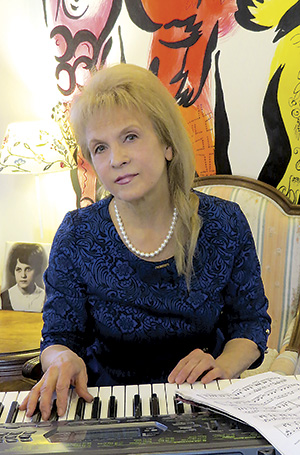 Twice a week, pensioner Alla Bashkirova travels from Baranovichi to Gantsevichi and back to teach music at Gantsevichi’s arts school. She loves to draw out young talent but is also keen to keep busy. “When people retire, they start worrying about becoming ill.
Twice a week, pensioner Alla Bashkirova travels from Baranovichi to Gantsevichi and back to teach music at Gantsevichi’s arts school. She loves to draw out young talent but is also keen to keep busy. “When people retire, they start worrying about becoming ill. Working diverts your attention!” she reasons.
Аlla has been travelling between Baranovichi and Gantsevichi for the past seven years, and it’s not the first commute of her life either. She tells us, “As a 4th year student at Minsk’s Glinka College, I began teaching in Minsk and then took a job in Uzda, for solfeggio and accordion. I was only 19 years old but was also asked to head the choir.”
She made time to do everything and that passion remains. Alla believes that a good teacher can interest anyone in music, even those who don’t like to sing. She explains, “I teach not only the piano and singing, but the foundations of music culture. Children learn the names of world composers, including such Belarusians as Churkin, Aladov, Smolski, Pomozov, Dorokhin, Gorelova, and Murashko. I want young people to know how music was created at different times. To remind them of Soviet history, I bring a turn-table from home and play records on it.”
Talking about ancient times, and such personalities as Stanisław Moniuszko and Michał Kleofas Ogiński, do you perceive them as domestic or foreign?
Music has no nationality, it has style — baroque, classicism, romanticism, impressionism, jazz, and so on. Of course, we should be proud of Michal Kleofas Oginski, who composed the immortal polonaise ‘Farewell to Homeland’. He is our compatriot. Last year, we held a conference devoted to our countryman, where he was called a ‘Belarusian, Polish and Lithuanian composer’.
Ms. Bashkirova views People’s Artiste Lyudmila Yefimova as her mentor. The outstanding representative of the Leningrad School of Choral Conducting worked for more than 20 years as a teacher at Minsk Glinka Musical College. In 1987, she took over as head of the State Shirma Academic Choir.
Alla never aspired to high career achievements, wishing to return to Baranovichi and her father, a veteran of World War II, who gave so much to ensure that she received her education.
Do you ever feel that you live in a cultural backwater?
Never. Do you know why? We’ve always played across various city platforms, at other schools and for military units. I even have a badge ‘For cultural patronage of the Armed Forces’. However, this was from the days when performances were given free of charge. It’s different now: we are learning to earn. We still perform a great deal, giving concerts and musical evenings, but we charge a modest fee. People still come, to Gantsevichi, Liakhovichi and Bara-novichi. A backwater would be a place without culture. We have culture, because we ourselves create it.
Alla has been lucky in working with the director of Gantsevichi school, Valery Martinkevich, who plays the accordion, heads a folk group, and composes music. Working with a creative and friendly team helps motivate her to continue making the journey to work.
How important is the salary for a pensioner? Ms. Bashkirova doesn’t hide the fact that her salary from school makes a useful addition to her household budget but she insists that her main motivation is ‘inspiration’ rather than money. She’s seeking a permanent home in a village in Minsk Region, and plans to find teaching work wherever she ends up. She cannot sit and do nothing. She notes, “If there’s no employment at the nearby school, I’ll organize a music salon at home. I already know what it will look like: beautiful chairs, a piano, and a portrait of Ogiński on the wall.”
By Viktar Korbut
From the mouth of a child
“My friends ask whether I find it interesting to go to music school, and always ask me to play something for them,” says one of the children at the art school in Gantsevichi. Here are comments from other pupils of Alla.
1st form
Natasha Solodkova:
“When I’m ill, I play piano, and I feel better at once.”
2nd form
Kristina Blinkovskaya:
“I live far away from school, on the outskirts of Gantsevichi, but I’m learning for myself and am happy to attend classes. Most of all, I like to write the beautiful G clef and notes.”
3rd form
Alisa Vlasova: “Once, on television, I saw a performance by pianists, which made me want to learn. In music lessons, I like that, instead of traditional tests and examinations, we give concerts. Recently, I began guitar lessons, as my father plays well. I want to learn to play even better.”
Nastya Melekhovets:
“Solfeggio is my favorite subject. Music helps me to develop my memory. I also like mathematics.”
Zhenya Baranets:
“In the 2nd form, the teacher came to select children for music school. I decided to take violin lessons, not knowing that it is the most difficult instrument, but I like it very much.”
5th form
Sasha Rylko:
“My mother brought me to music school, as she studied at a similar establishment. My grandfather plays accordion; our favourite piece is a waltz for the accordion called On the Hills of Manchuria.”
Alesya Polyachok:
“I decided to connect my life with music and become a teacher of piano, teaching others to play.”












